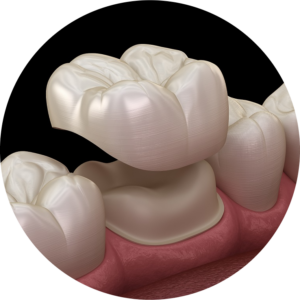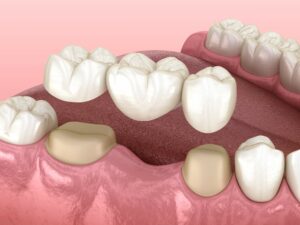
The Norterra Dentist uses porcelain with our dental crowns and bridges. This material is both strong and natural-looking. You won’t only see the difference, but you’ll feel it as you return to your daily routines. You’ll be able to eat and speak significantly better than before. With our talented team at The Norterra Dentist, you’ll wonder why you ever waited in the first place!
What Is a Dental Crown?
A dental crown is essentially a cap that is attached to an existing tooth, covering all sides of the tooth that is visible. If a tooth is broken or compromised somehow, the dental crown will restore the chewing surface while protecting you from further damage or infections. They are often used after root canals.
When Is a Tooth Crown Needed?
There are a variety of reasons why someone would need a dental crown.
- After a root canal procedure.
- Rescuing broken or decayed teeth.
- Adding extra protection to teeth.
Benefits of Dental Crowns
Some of the most valuable assets to having a dental crown are:
- Avoiding extracting damaged teeth.
- Preventing further decay or infection.
- Restoring your smile and health.
What Is a Dental Bridge?

A dental bridge is used if a person is missing one or more teeth, and is made up of a series of tooth crowns. This method “bridges” the gap between missing teeth by using existing teeth as anchors, restoring your original smile while matching the existing teeth around it. This is also a non-surgical option for our patients.
When Is a Tooth Bridge Needed?
There may be various reasons why a dental bridge may be necessary.
- If one or more teeth are currently missing.
- If someone needs multiple teeth removed in a row.
- Existing teeth are shifting into gaps in the smile.
Benefits of Dental Bridges
The advantages of someone getting a dental bridge are:
- Spend less than on dental implants.
- Protect the exposed gum line from bacteria.
- Keep your teeth from moving around.
Dental Bridge vs. Implants
While both methods are great choices, let us break down some of the differences.
- Dental Bridges are a more affordable and faster avenue for someone looking to fix a gap without surgery. It offers the same realistic appearance as an ordinary crown or implant. The drawback is that they do not address the bone loss of a jaw that has lost its tooth roots.
- Dental Implants are a truly permanent solution. With a dental implant, the jawbone is stimulated. This limits the loss of bone tissue and can allow your jawbone to recover and heal, becoming stronger and healthier!
Which Option Is Right for Me?
Our experienced professionals at The Norterra Dentist keep your goals and budget in mind when designing a treatment plan that’s right for you.
Reasons to choose dental crowns:
- You’re not missing any teeth.
- You have teeth that are damaged or infected.
- You want to protect your teeth.
Reasons to choose a bridge:
- You are missing one or more teeth in a row.
- You want to save money on replacing your teeth.
Reasons to choose an implant:
- You’re missing a single tooth.
- You want the full benefit of a tooth-like prosthetic.
- Your jawbone is in danger of deteriorating.
We use advances in technology to give our patients beautiful and accurate results that will give you your confidence back. You don’t have to be shy about your smile anymore!
All of the options available to you come with the peace of mind of knowing that we utilize quality materials with our services, whether that be tooth crowns, dental bridges, or dental implants Unlike other dental offices, we offer the convenience of doing entire procedures in-house. From diagnosis to the full placement of implants, we do it all!
Call The Norterra Dentist Today to Discuss Your Tooth Replacement Options!
Everyone’s mouth is unique, which is why your treatment plan should be, too! Contact us today and we will help guide you on the options available for a brighter smile tomorrow.
You May Also Be Interested In
This page has been reviewed for medical accuracy by Dr. Roopinder Mann, owner of The Norterra Dentist and graduate of University of Illinois Chicago College of Dentistry

